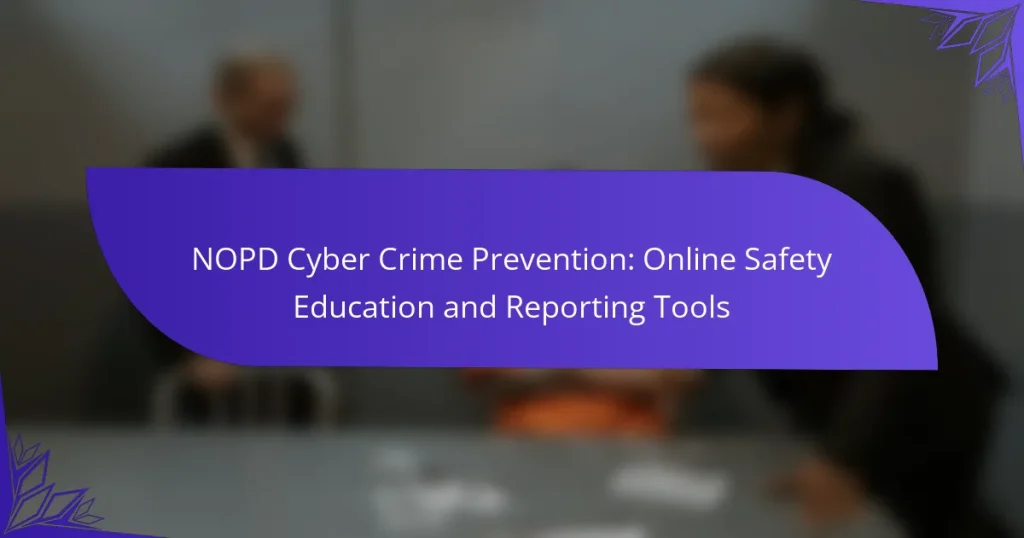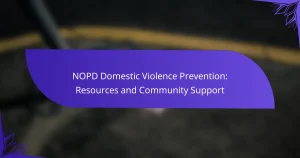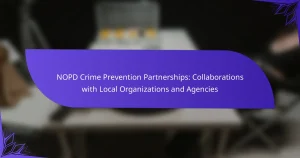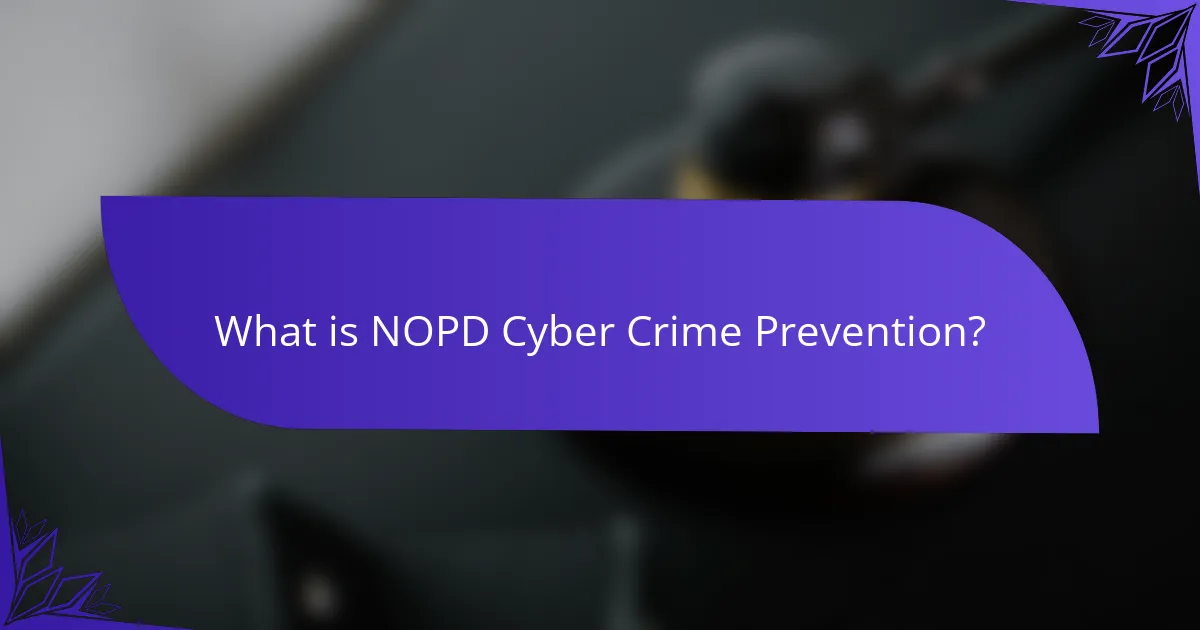
What is NOPD Cyber Crime Prevention?
NOPD Cyber Crime Prevention is a program initiated by the New Orleans Police Department. It aims to educate the public about online safety. The program provides resources and tools for reporting cyber crimes. It focuses on raising awareness of potential threats and preventive measures. NOPD offers workshops and materials to inform citizens. The initiative addresses various forms of cyber crime, including identity theft and online scams. By promoting online safety, NOPD seeks to reduce cyber crime incidents in the community.
How does NOPD Cyber Crime Prevention contribute to online safety?
NOPD Cyber Crime Prevention enhances online safety by providing education and resources to the community. It offers training sessions on recognizing cyber threats. These sessions cover topics like phishing, malware, and safe browsing practices. The program also provides reporting tools for victims of cybercrime. This enables individuals to report incidents quickly and efficiently. Furthermore, NOPD collaborates with local organizations to spread awareness. Statistics show that communities engaged in educational programs report fewer cyber incidents. Overall, NOPD’s initiatives empower citizens to protect themselves online.
What are the key components of NOPD Cyber Crime Prevention programs?
The key components of NOPD Cyber Crime Prevention programs include online safety education, community outreach, and reporting tools. Online safety education focuses on teaching individuals about safe internet practices. This includes recognizing phishing attempts and securing personal information. Community outreach involves engaging with local organizations and schools to promote cyber awareness. Reporting tools facilitate easy reporting of cyber crimes to law enforcement. These tools are designed to streamline communication and enhance response times. Together, these components aim to reduce cyber crime and increase public awareness.
How do these components enhance community awareness?
The components enhance community awareness by providing essential information on online safety. They educate residents about the risks associated with cyber crime. Increased knowledge helps individuals recognize potential threats. Awareness campaigns promote vigilance in the community. Reporting tools empower citizens to report suspicious activities. Easy access to resources fosters proactive engagement. Data shows that informed communities experience lower crime rates. For example, communities that participate in safety education programs report a 30% increase in reporting incidents.
Why is online safety education important in NOPD Cyber Crime Prevention?
Online safety education is crucial in NOPD Cyber Crime Prevention because it empowers individuals to recognize and avoid potential threats. Educated users are less likely to fall victim to phishing, malware, and other cybercrimes. Informed communities can report suspicious activities more effectively, enhancing overall public safety. Training programs have shown that awareness decreases the likelihood of successful cyber attacks. For instance, studies indicate that organizations with robust training see a 70% reduction in security incidents. This proactive approach fosters a safer digital environment for everyone. Thus, online safety education is a foundational element in combating cyber crime effectively.
What topics are covered in online safety education initiatives?
Online safety education initiatives cover various essential topics. These topics include internet privacy, which teaches users how to protect personal information online. Cyberbullying awareness is another critical area, focusing on recognizing and addressing online harassment. Digital footprint management is also addressed, emphasizing how online actions can impact future opportunities. Additionally, safe social media practices are taught to help users navigate platforms securely. Understanding phishing and scams is crucial, as it equips individuals to identify and avoid online fraud. Finally, the importance of secure passwords and account protection is highlighted to enhance overall online security.
How do educational programs address specific cyber threats?
Educational programs address specific cyber threats by providing targeted training and awareness initiatives. These programs teach individuals about the nature of cyber threats, such as phishing and malware attacks. They often include hands-on simulations to demonstrate how these threats occur. Educational content is tailored to different audiences, including children, parents, and professionals.
Research indicates that awareness training can reduce the likelihood of successful cyber attacks by up to 70%. Programs often include guidelines for safe online behavior. They also promote the use of security tools, such as antivirus software and password managers. By fostering a culture of cybersecurity awareness, educational programs empower individuals to recognize and respond to threats effectively.
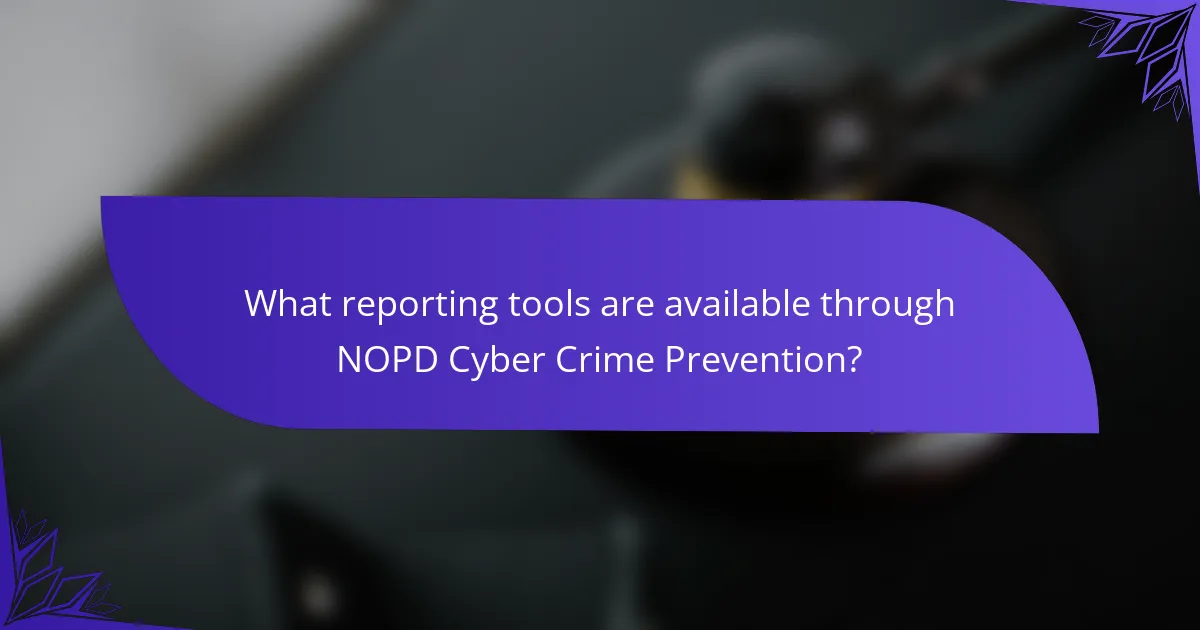
What reporting tools are available through NOPD Cyber Crime Prevention?
NOPD Cyber Crime Prevention offers several reporting tools for citizens. These tools include an online reporting form for cyber crimes. Citizens can report incidents such as identity theft and online harassment. The NOPD also provides a dedicated email address for reporting cyber crime concerns. Additionally, there is a phone number available for immediate assistance. These resources aim to facilitate prompt reporting and response to cyber-related issues. The availability of these tools enhances community engagement in cyber crime prevention efforts.
How can individuals report cyber crimes effectively?
Individuals can report cyber crimes effectively by following specific steps. First, they should gather all relevant evidence, including screenshots and emails. Next, they should contact local law enforcement or cybercrime units directly. Many countries have dedicated agencies for cybercrime, such as the FBI’s Internet Crime Complaint Center (IC3) in the United States. Individuals can also report incidents to organizations like the Cyber Crime Reporting Portal. Providing detailed descriptions of the crime helps authorities investigate. Reporting promptly increases the chances of recovering losses and preventing further crimes. According to the FBI, timely reporting is crucial for effective response and prevention.
What information should be included in a cyber crime report?
A cyber crime report should include the date and time of the incident. It must detail the nature of the cyber crime. This includes whether it was hacking, phishing, or identity theft. The report should identify the victim and any affected systems or accounts. Contact information for the victim is essential for follow-up. A description of the evidence collected is also necessary. This includes screenshots, emails, or logs. The report should outline any actions taken by the victim. This may involve changing passwords or contacting financial institutions. Finally, it should include information on any suspects if known. Accurate reporting aids law enforcement in investigations.
How does NOPD handle reported cyber crime incidents?
NOPD investigates reported cyber crime incidents through a specialized Cyber Crime Unit. This unit collaborates with federal agencies like the FBI. They gather evidence and analyze digital data related to the incidents. Victims are encouraged to report cyber crimes via the NOPD website or by visiting a local precinct. The department provides resources for victims to understand their rights and the reporting process. NOPD also conducts outreach programs to educate the community about online safety. This proactive approach aims to prevent future cyber crimes and enhance public awareness.
What technologies are utilized in NOPD’s reporting tools?
NOPD’s reporting tools utilize various technologies, including web-based platforms and mobile applications. These tools are designed for user-friendly access to report cyber crimes. They incorporate data encryption to ensure the security of sensitive information. Additionally, they use real-time data analytics to track and analyze reported incidents. Geographic Information Systems (GIS) are also employed for visualizing crime data geographically. These technologies enhance the efficiency and effectiveness of reporting and response processes.
How do these technologies improve reporting accuracy?
These technologies improve reporting accuracy by automating data collection and analysis. Automation reduces human error, leading to more reliable information. Real-time data processing allows for immediate updates and corrections. Enhanced user interfaces facilitate easier input of accurate information. Integration with existing databases ensures consistency across reports. Advanced algorithms can identify patterns and anomalies, increasing detection rates. Studies show that automated systems can improve reporting accuracy by up to 30%. This increase is critical in cyber crime prevention efforts.
What role does user experience play in these reporting tools?
User experience is crucial in reporting tools as it directly affects user engagement and satisfaction. A well-designed user interface simplifies navigation and makes reporting incidents easier. Clear instructions and intuitive layouts help users complete reports without confusion. Effective feedback mechanisms enhance user confidence in the reporting process. Research indicates that tools with positive user experiences lead to higher reporting rates. For instance, a survey by the Pew Research Center found that 70% of users prefer tools that are easy to use. Thus, user experience significantly influences the effectiveness of reporting tools in cyber crime prevention.
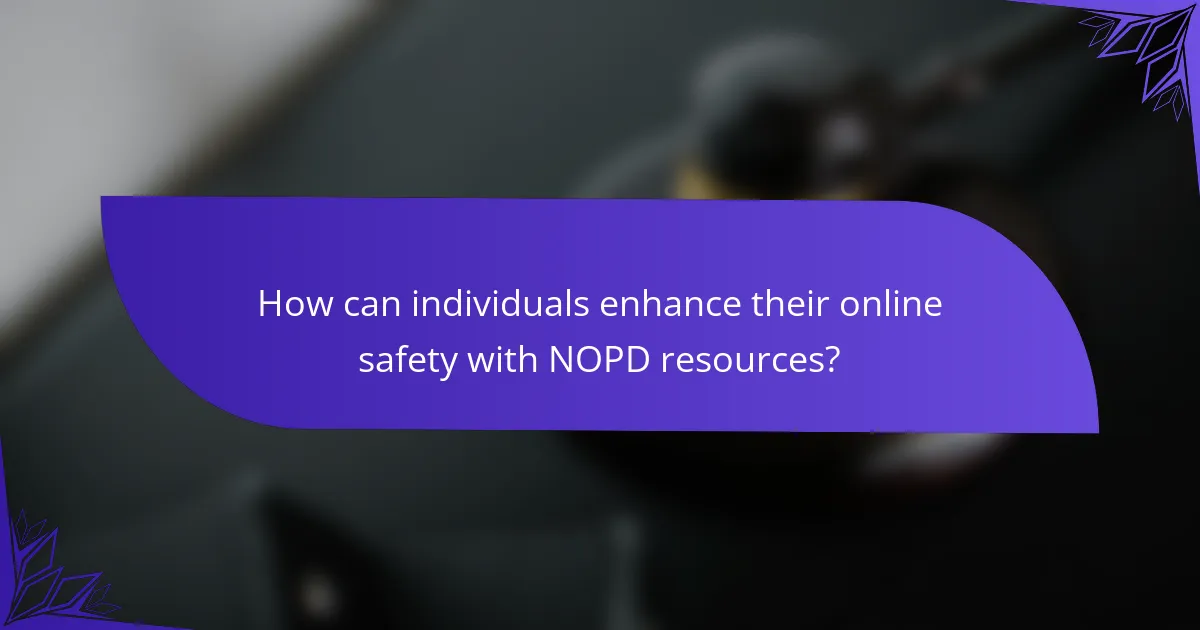
How can individuals enhance their online safety with NOPD resources?
Individuals can enhance their online safety using NOPD resources by accessing educational materials and reporting tools. NOPD provides comprehensive online safety education to inform users about potential cyber threats. This includes tips on recognizing phishing scams and securing personal information. Furthermore, NOPD offers reporting tools for individuals to report suspicious online activities. Utilizing these resources helps individuals stay informed and proactive in their online safety efforts. Regularly engaging with NOPD’s updates ensures awareness of the latest cyber threats and prevention strategies.
What best practices should individuals follow for online safety?
Individuals should follow several best practices for online safety. First, use strong, unique passwords for each account. A strong password typically contains at least 12 characters, including letters, numbers, and symbols. Second, enable two-factor authentication wherever possible. This adds an extra layer of security beyond just a password. Third, be cautious about sharing personal information online. Limit the amount of personal data shared on social media platforms. Fourth, keep software and devices updated. Regular updates often include security patches that protect against vulnerabilities. Fifth, use secure connections. Avoid public Wi-Fi for sensitive transactions, as these networks can be easily compromised. Sixth, recognize phishing attempts. Be wary of unsolicited emails or messages asking for personal information. Following these practices significantly reduces the risk of online threats.
How can users identify potential cyber threats?
Users can identify potential cyber threats by recognizing unusual online behavior. This includes unexpected emails, messages, or notifications. They should also look for suspicious links or attachments. Unusual requests for personal information are red flags. Users must be aware of signs of phishing attempts. These may include poor grammar or urgent language. Monitoring account activity regularly helps in spotting unauthorized access. Keeping software and security systems updated reduces vulnerability.
What steps can users take to protect their personal information?
Users can take several steps to protect their personal information. First, they should use strong, unique passwords for each account. A strong password typically includes a mix of letters, numbers, and special characters. Next, users should enable two-factor authentication whenever possible. This adds an extra layer of security beyond just a password.
Additionally, users should regularly update their software and applications. Outdated software can have vulnerabilities that cybercriminals exploit. Users should also be cautious about sharing personal information online. They should limit the amount of personal data shared on social media and other platforms.
Finally, using a reputable antivirus program can help protect against malware and other threats. According to the Cybersecurity & Infrastructure Security Agency, these practices significantly reduce the risk of identity theft and data breaches.
What resources does NOPD provide for ongoing education and support?
NOPD provides various resources for ongoing education and support in cyber crime prevention. These resources include training programs for community members on online safety. NOPD also offers workshops that focus on identifying and reporting cyber crimes. The department maintains an online portal with educational materials and updates on cyber threats. Additionally, NOPD collaborates with local organizations to enhance community awareness. These initiatives aim to empower citizens with knowledge and tools to protect themselves online.
How can individuals access NOPD’s online safety materials?
Individuals can access NOPD’s online safety materials through their official website. The NOPD website contains a dedicated section for safety resources. This section includes educational materials on various safety topics. Users can find downloadable guides and informative articles. Additionally, the website provides links to reporting tools for cyber crimes. Accessing these materials is free and available to everyone. The online resources are regularly updated to ensure accuracy. This allows individuals to stay informed about safety practices.
What community events are held to promote cyber safety awareness?
Community events held to promote cyber safety awareness include workshops, seminars, and community fairs. These events are organized by law enforcement agencies, schools, and non-profit organizations. Workshops often focus on practical skills, such as recognizing phishing attempts and securing personal devices. Seminars may feature expert speakers discussing the latest cyber threats and safety practices. Community fairs provide interactive activities and resources for families to learn about online safety. According to the National Cyber Security Alliance, these events significantly increase public awareness and knowledge about cyber safety issues.
What are the common challenges faced in cyber crime prevention?
Common challenges in cyber crime prevention include the rapid evolution of technology. Cyber criminals continuously adapt their tactics, making it difficult for law enforcement to keep up. Additionally, a lack of resources often hampers effective prevention efforts. Many organizations do not have sufficient funding or personnel dedicated to cybersecurity.
Another challenge is the complexity of cyber crime laws, which can vary by jurisdiction. This inconsistency complicates enforcement and prosecution. Public awareness is also lacking, as many individuals do not understand the risks or how to protect themselves.
Furthermore, the anonymity provided by the internet makes it hard to trace offenders. This anonymity can embolden criminals, leading to an increase in cyber crime incidents. Finally, many businesses fail to implement robust cybersecurity measures, leaving them vulnerable to attacks. These factors collectively hinder effective cyber crime prevention efforts.
How can individuals overcome these challenges effectively?
Individuals can overcome challenges in cyber crime prevention by enhancing their online safety education. They should engage in training programs that focus on recognizing phishing scams and secure password practices. Utilizing multi-factor authentication adds an extra layer of security. Regularly updating software and devices helps protect against vulnerabilities. Reporting suspicious online activity to authorities is crucial for community safety. According to the FBI, reporting incidents can aid in investigations and prevent further crimes. Additionally, participating in community workshops fosters a culture of awareness and preparedness. These strategies collectively empower individuals to navigate online risks effectively.
What role does community involvement play in enhancing cyber safety?
Community involvement plays a crucial role in enhancing cyber safety. Engaged communities can share knowledge about cyber threats and best practices. This collective awareness fosters a culture of vigilance. For example, community workshops can educate individuals on recognizing phishing attempts. Local organizations can also provide resources for reporting cyber incidents. Studies show that communities with active cyber safety programs report fewer incidents. Enhanced communication among residents leads to quicker responses to threats. Overall, community involvement strengthens the collective defense against cyber risks.
NOPD Cyber Crime Prevention is a program by the New Orleans Police Department aimed at enhancing online safety through education and reporting tools. The initiative focuses on raising public awareness about cyber threats, providing resources for reporting incidents like identity theft and online scams, and conducting workshops to educate citizens on safe internet practices. Key components include online safety education, community outreach, and user-friendly reporting tools designed to facilitate prompt reporting of cyber crimes. By empowering individuals with knowledge and resources, NOPD seeks to reduce cyber crime incidents and promote a safer digital environment.
